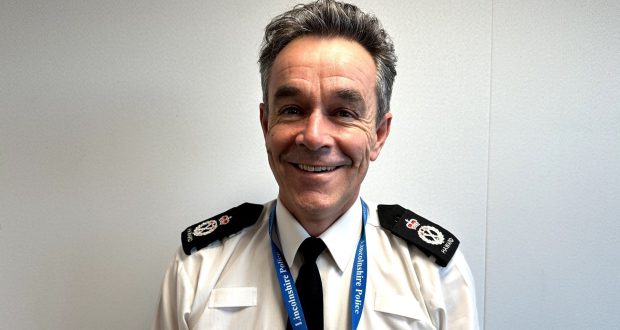The outgoing chief constable of Lincolnshire Police says reducing the number of PCSOs was the hardest thing he’s had to do as he looks back on three years in the role.
Chris Haward joined Lincolnshire Police as Chief Constable in December 2020, taking over from Bill Skelly.
In that time he has seen COVID-19 lockdown restrictions, public protests, and his officers hit national headlines for dancing at a Pride event.
He officially leaves the force in February 2024, moving on to pastures new with the National Police Chief’s Council.
The departing Chief Constable said he had “very mixed emotions” about leaving Lincolnshire Police, citing family circumstances and an exciting opportunity as his reasons behind saying goodbye to the local force’s top job.
“It’s not what I wanted to do at this stage,” he admits. “But family circumstances kind of played a part in this, and then the opportunity at the same time. I’m going into a really good job with a national serious and organised crime coordinator role.
“I’d always anticipated I’d be here for five years, but life has a way of throwing curveballs at you. Before Christmas, the only way I could describe it is that I was grieving, but now I’ve come into the New Year I’m thinking about getting my head into the new job and looking at it more positively.
“It’ll be a sad day when I walk out, absolutely.”
He describes the COVID-19 period as a “challenge” and says it was tough to “move back into normality” after the lockdowns eased and public life returned to what it was pre-2020.
“Everybody had got used to working from home, we had minimum staffing levels, and the challenge was that cultural transition of coming back into the office.
“As well as this, we saw the sudden rise in anti-social behaviour and public order. It wasn’t going anywhere exceptional compared to pre-COVID, but obviously people have gone through two years of none of that kind of thing happening, to it suddenly exploding again.
“I think the force has adapted really well to COVID, taking a very balanced and proportionate approach, which was very much about the education and engagement rather than enforcement.
“That speaks volumes for the way this force operates, it’s very much here for the community and with the community.”
Another clear challenge for Lincolnshire Police and Chris has been public perception and trust in the force, particularly off the back of a difficult few years for national policing — whether it be the tragic murder of Sarah Everard at the hands of then-police officer Wayne Couzens, or the Louise Casey report into the Metropolitan Police last year.
Mr Haward said it has been “difficult” at times due to the national headlines of such incidents, but was keen to stress that these were the “horrible” and “extreme” actions of “one or two individuals” who “don’t represent the wider policing body.”
He adds: “They certainly don’t represent me and the officers and staff I see at this force.
“One of the pieces we’ve focused on in the three years I’ve been here has been about our culture, and the approach of having the courage to speak out and stand up for people.
“It’s about being an upstander, not a bystander. We’re very robust in getting rid of people who demonstrate these negative behaviours, so it’s encouraging our own officers and staff to have the courage to stand up, but it’s also about our leaders listening and doing something about it.
“We shouldn’t tar policing with the same brush, because individuals being bad happens in every walk of life, we need to keep it in context and keep it in proportion.”
When asked for what he considers to be Lincolnshire Police’s greatest achievement during his three-year tenure as Chief Constable, Haward’s answer pointed to the end of a contractual agreement with contractor G4S, a private security firm that worked alongside Lincolnshire Police for ten years before the decision was made not to renew its contract in 2020.
“I think the way we transitioned with G4S was as smooth and positive as it could have been in any merger or transition of that kind of nature. The way it happened, I thought, was exceptional, and so were the people involved.
By way of regrets, the Chief Constable said there were multiple difficult facets in his role, but the hardest thing he says he had to do was cutting police community support officer numbers almost in half last year.
He says of this: “Funding has always been a challenge, but the hardest thing I’ve had to do was reducing our PSCO numbers.
“If there had been any way of avoiding that, I would have, and I think my regret is not so much about the decision, but having to do it in the first place.
“I was put in a position that left me with no choices, because honestly I think PCSOs should be here and be part of the policing structure, because they offer a really vital service, which is why I kept a core of them.
“It’s easier to rebuild from a base than it is from nothing at all, so I hope that whoever comes in the future, if the funding position changes, they may rethink that and start to reinvest into the PCSO numbers.”
 The Voice of Spalding and South Holland
The Voice of Spalding and South Holland




